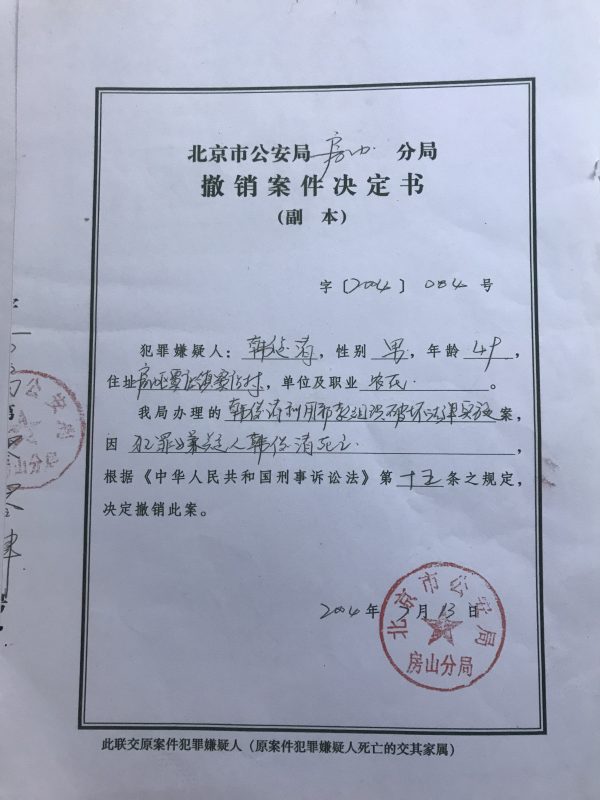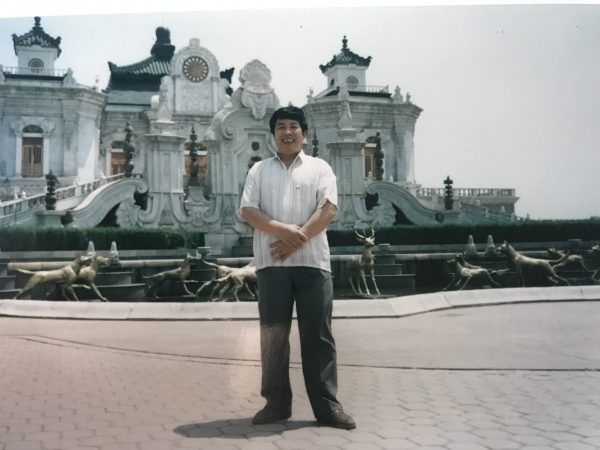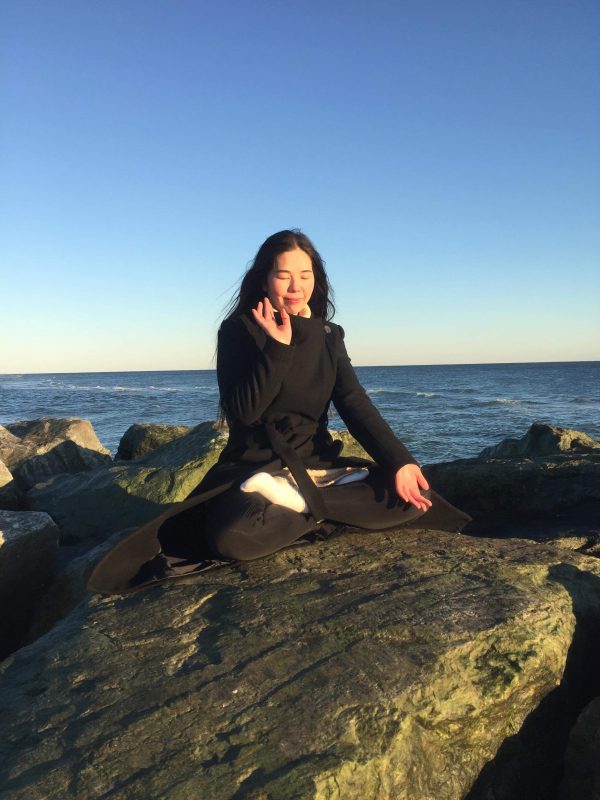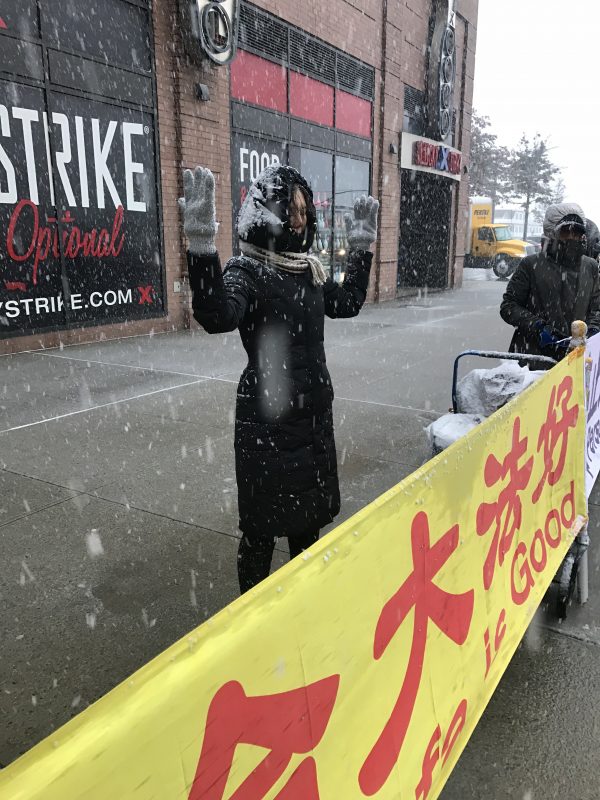BY
Ten police cars accompanied a small group of relatives to view Han Jun Qing’s body. No cameras or reporters were allowed on the premises.
But his daughter, Han Yu, needs no photograph or article to help her recount exactly what she saw that day.
In an interview with Han Yu, she said: “My father’s body was extremely thin. There were wounds on his face. There was tissue missing from under his left eye. His face was bruised green and purple.
“I saw a long knife incision, sewn together with black thread, starting at his throat, and going down until it reached his chest, where his clothes covered the rest. I tried to remove his shirt to see where the cut ended, but the police stopped me and forced me out.”

Only two people at a time were allowed to enter the room where Jun Qing’s body lay cold, supervised by two police officers, while uniformed officials surrounded the complex outside.
“Later, my aunt and uncle went in, and forced the buttons of his shirt open. They saw that the incision reached from his neck all the way down to his abdomen—a very obvious knife wound.
“They pressed down on his stomach, and found that the inside of his abdomen had no organs—it was full of ice. So his body took twice the time as normal to cremate compared to the average male body.”
At the time, the world did not yet know that the Chinese Communist Party was secretly practicing forced organ harvesting from prisoners of conscience—a practice that has continued unabated to the present day.

The Persecution
When Han Yu’s father was arrested for the first time, both she and her brother watched as the police dragged him out the door and ransacked their house. At the time, she was 14, a high school student living an ordinary life.
“I told the police, you’re arresting a good person, and he raised his hand to hit me… After about a month, they arrested my stepmother as well, so there was only my brother and I left at home.”
Han Yu’s parents were arrested for practicing Falun Gong, a spiritual discipline which teaches virtues, including moral philosophies with Buddhist and Taoist elements. The practice involves meditation, and draws on Chinese traditional cultivation practices such as qigong, a regimen of controlled breathing and gentle physical movements.
Falun Gong was practiced freely in China until 1999, when then Chinese Communist Party leader Jiang Zemin launched a systematic campaign to vilify and destroy Falun Gong.
The police ransacked Han Yu’s home, and confiscated all materials related to the spiritual practice.
But the police still would not leave the family alone. One day Han Yu received a phone call from a Falun Gong practitioner who asked to stay overnight at her home. When Han Yun went to pick her up the next day, she noticed a police car following her down the street. She returned home after walking around the block.
Within the hour, several police officers arrived at her door and forced their way inside, conducting a search of the premises and interrogating her about where she had gone, and what she had been doing.
The Falun Gong practitioner who had asked to stay with her never called again.
“Even without my parents at home, they were still harassing me. That’s when I became really afraid of the police.”
At school, parents told their children to avoid Han Yu and her brother out of fear that their families would be implicated.
During that period of time, her 9-year-old brother became very introverted and began to skip school. “He suffered more than me because he was very young,” Han Yu said.
When her father finally returned home, he was no longer the same man who entered the prison swearing to uphold his beliefs. He took up old habits which he had discarded many years ago after devoting himself to the spiritual practice. His bad temper returned, as well as his gambling habits and excessive cigarette and alcohol consumption. Prior to practicing Falun Dafa, he was a well-known hooligan in the local community.
“When he started practicing Falun Gong, the entire family atmosphere changed,” Han Yu said. “At that time, I was the happiest I’ve ever been.”
Her father returned from prison with stories of torture. He was often beaten by the guards. Once, he was simultaneously struck with ten electric batons.
After her father recovered, he again gave up his bad habits and swore to hold on to his belief in Falun Gong.
Though he didn’t know it at the time, he swore this vow on his life.
Han Jun Qing passed away on May 4, 2004—three months after he was arrested for the second and final time.
Han Yu did not know of her father’s incarceration as she was no longer living at home. One day, she received a call.
“I was in shock. Panic. I could not accept reality.
“I could not believe that they had killed my father. I thought that the call was made by mistake. Not up until I saw his body, did I…”
Han Yu’s voice broke off abruptly, pausing for a heavy moment. “I could not believe it until I saw his body, and I saw that he was really gone. At the time, my mind snapped. I could not sleep, and when I did, I would have nightmares.
“I would dream of my father often.”
Following her father’s death, her stepmother was released from prison. But what she had experienced was enough to terrify her into never practicing her beliefs again.

A Journey West to Freedom
As a child, Han Yu practiced Falun Dafa with her parents. After her father’s death, she stopped.
Then, on one night in 2013, Han Yu dreamed of her father.
“My father in the dream was quite different. He looked very healthy and alert, and he said he wanted to bring me to a place. I asked him where, and he said, just come with me.”
“He brought me in front of two elevators. One was going up, and the other going down. He was standing with me in front of the one going up. He was trying to tell me to find what I had lost, and then to stay true to my beliefs.”
Soon after her dream, Han Yu traveled to Hong Kong, where she was shocked to discover that there were still Falun Dafa practitioners out on the streets, speaking out against the evil which had persecuted them, and spreading the truth about communist propaganda.
She decided to take up her faith once more.

In 2015, Han Yu traveled to the United States to attend a gathering of Falun Gong practitioners from all over the world. Upon her return to China five days later, she was arrested along with her roommate and landlord, who were also practitioners.
She was interrogated in a police station about her brief stay in the United States, and chained to a metal chair with nothing to eat or drink for an entire day.
Police eventually released her as they did not have sufficient evidence that she was practicing Falun Gong.
However, Han Yu knew that it was time to leave.
Chinese workplaces now require employees to provide their social security numbers, and the phones of citizens are being monitored.
When asked why she chose the United States as her asylum, Han Yu laughed. “Why the United States?
“Because it’s free.”
On Oct. 15, 2018, Han Yu, now aged 33, arrived in New York.
“My first feeling upon coming here is—freedom. In China, I had to be extremely careful when reading a Falun Dafa book—I could never take it outside. Here I can read the book on the subway, do the exercises in parks, even practice in front of the Chinese embassy. I don’t have to worry about getting arrested or persecuted.
“But to be honest, there is still a part of me that hasn’t escaped China, as I still feel an irrational fear every time I see police.”
Now on every weekday, in rain or snow, Han Yu stands tall in front of the Chinese embassy, holding up banners and passing out flyers to countless strangers in her own effort to spread the truth about her beliefs and expose the evils perpetrated by the Chinese government.

She hopes to one day bring justice to the people responsible for her father’s death.
During the crackdown, Jiang Zemin had said the following: “Defame their reputation, bankrupt them financially, destroy them physically.”
He introduced genocidal policies to be performed by what is known as the “610 Office.” Examples of such policies include, “No measures are too excessive,” “No responsibility if beaten to death,” “Consider it suicide if beaten to death,” and “Cremate the body immediately without confirming the identity.”
Yet despite everything she had suffered at the hands of the Chinese police, Han Yu said: “I feel… actually, the police are quite pitiful. They really don’t know the truth. They think that what they believe in is right—because people are encouraged not to think independently in China.
“If they knew the kind of people we are, they wouldn’t persecute us like this.”
Han Yu remembers her father with pride as she takes up his mantle. “To the very end, he didn’t bow to persecution and held to his beliefs.
“I will also hold on to my beliefs, and spread the truth everywhere—to save more of the people living in China who are being persecuted for what they believe in. I still have friends in prison.”

